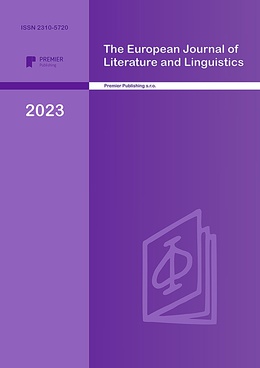RIDDLES AND THEIR MAIN FEATURES IN ENGLISH AND UZBEK FOLK GENRES
Authors
Abdujabborova Shohista Adiljanovna

Share
Annotation
The aim of this research paper was to identify the main characteristics and functions of riddles in comparative languages. Riddles are detailed explained, and substantiated in the section of English and Uzbek literature examples. The paper showed that the informative, illustrative, didactic, cognitive-heuristic, and comparative features of riddles can give the maximum quality of conscious feed for the riddler and finder which leads to logical thinking, synthesizing the base of knowledge acquired during a person’s life, analyzing mental imagination, figurative thinking, and increasing intelligence.
Keywords
Authors
Abdujabborova Shohista Adiljanovna

Share
References:
Abdurahimov M. (1991). Uzbek folk riddles. Asian Book House. – 65 p.
Avezov S.S. (2021). Content and features of Uzbek children's folklore games // Scientific progress volume 2. Issue 7. Uzbekistan. – Pp.1179 -1185.
Danieva M.D. (2021).The contribution of language units to the realization of informativeness in the text // Foreign languages in Uzbekistan. — No. 3 (38). — P. 20-30. https://doi.org/10.36078/1624430472
Fedorov A.V. (1983) Fundamentals of the general theory of translation. M.: Higher. school. – 303 p.
Ipatenkova Yu. A. (2019) Sushchnost concept «comparison» in comparative pedagogy // Somparative pedagogics. Siberian pedagogical journal, No. 1. – 109-114.
Joraev M. (2008). Basics of folklore. – Tashkent: Science. – 98 p.
Karasik V.I. (2013). Language matrix of culture: monograph. - Moscow: Gnosis. - 319 p.
Kholdarova I.V. (2021). Folk riddles and generative lexemes // International Journal of Word Arts. No. 2 (4). – P. 29-33.
Kenges-Maranda E. (1978). The logic of riddles // Paremeological collection. proverb. Riddle (Structure, meaning, text). - Moscow: Nauka. – P. 249 -282.
Madaev O. (2008) Uzbek folklore. - Tashkent: Mumtoz Soz. – 250 p.
Olaosun I.E., Faleye J.O. (2015). A Cognitive Semantic Study of Some English Riddles and Their Answers in Amidst a Tangled Web // Asian Journal of Social Sciences & Humanities. - Leena and Luna International, Oyama, Japan. Vol. 4 (2) May. – P. Pp. 65-71.
Rajabova R.Z. (2020). Basics of stylization of folklore genres in Uzbek children's literature: Philos.doc. philol. science (PhD) ...diss. - Bukhara. – 139 p.
Steven Guns. Heuristics and Cognitive Biases. https://medium.com/usethics-doc
Strukova T.V. (2022) Using the cognitive-heuristic potential of the riddle genre in teaching Russian as a foreign language // Teaching notes of the Oryol State University. No. 1 (94), 2022 Scientific notes of Orel State University. Vol. 1 - no. 94. – P. 290-293.
Strukova T.V. (2014) Riddle Genre in Ancient and Late Latin Poetry (Based on the Riddles of Cleobulus and Symphosius) // Uchenye zapiski Orlovskogo gosudarstvennogo universiteta. No. 1 (57), 2014 Scientific notes of Orel State University. Vol. 1 - no. 57. Philological sciences. – P. 282-286.
Umida Yakubova. Society. https://archive.qalampir.uz/news/ushbu-suratda-nechta-tarvuz-borligini-toping-1213
Yusupova E. D. (2008). Cognitive features of English riddles-metaphors as units of secondary nomination // Bulletin of the Bashkir University. V.13. No. 1. – P. 73-75.
Online Encyclopedia. Komusinfo. https://qomus.info/encyclopedia/cat-d/didaktika-uz/


